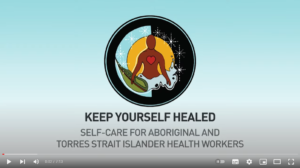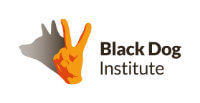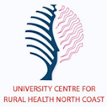Sign up below to receive monthly eMHPrac newsletters and updates about the latest digital mental health news, events, and resources.
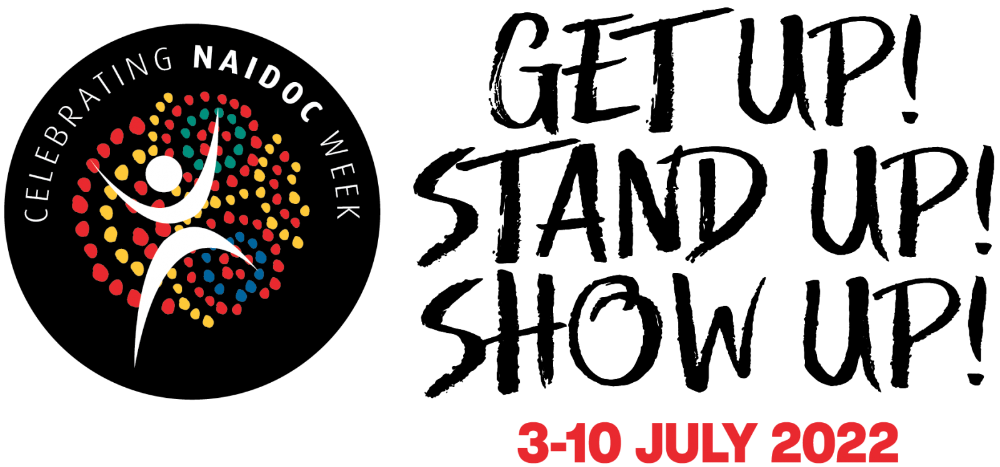
National NAIDOC week is coming up soon (3-10 July). Every year, NAIDOC week gives us the opportunity to learn about and celebrate First Nations cultures and recognise the achievements of Aboriginal and Torres Strait Islander peoples.
This year’s theme is ‘Get Up! Stand Up! Show Up!’. As a health practitioner, what will you be doing to further your knowledge and skills and ‘show up’ for your First Nations clients? This edition of the eMHPrac newsletter will link you in with the latest in digital services for the social and emotional wellbeing of First Nations peoples.
In this edition:
- NAIDOC Week 3-10 July: Show up for First Nations Australians with these resources
- Digital yarning spaces
- Podcast: Digital Mental Health Musings Episode 2
- On Demand Webinar: School Refusal
- See the eMHPrac team at these upcoming conferences
- Read the latest dMH research articles
- This month’s featured service: Burndawan
NAIDOC Week 3-10 July
‘Get Up! Stand Up! Show Up!’ for First Nations Australians with these resources
This year’s NAIDOC week theme is ‘Get Up! Stand Up! Show Up!’ You can show up for your Aboriginal and Torres Strait Islander clients by discovering the latest in digital social and emotional wellbeing resources. This year, ‘showing up’ might also mean focusing on self-care. Check out this short video below called ‘Keep Yourself Healed’.
WellMob
A website for health and wellbeing workers to easily access culturally relevant resources to use with their First Nations clients. Includes videos, apps, podcasts, and more, organised into six categories: Mind, Body, Our Mob, Culture, Keeping Safe and Healing.
MindSpot ‘Indigenous wellbeing course’
Online program combining practical skills and First Nations stories to manage wellbeing. Also offered as a workbook. Includes phone or online assessment, feedback and therapist support.
Stay Strong
A strengths-based therapist-guided app for indigenous clients with wellbeing concerns, chronic disease, or substance misuse problems.
Aboriginal Quitline
A culturally-sensitive, free and confidential telephone service providing customised assistance to help First Nations Australians with quit smoking attempts. Aboriginal Quitline can be accessed by calling 13 7848 and asking to speak to an Aboriginal Quitline counsellor.
https://www.quit.org.au/resources/aboriginal-communities/what-aboriginal-quitline/
Deadly Story
A portal and cultural information website developed to support Aboriginal and Torres Strait Islander children and young people to connect with their Country, their Communities, and their Aboriginal and Torres Strait Islander culture and identity.
Gamber’s Help – First Nations Gambling Awareness Program
Whilst primarily a link to community services for First Nations Australians, this site also provides factsheets with good information about dealing with a gambling worry.
https://gamblershelp.com.au/get-help/firstnations-communities/
Digital yarning spaces
Remember to reach out for support!
The WellMob website is your one-stop-shop of online wellbeing resources for health & wellbeing workers to use with their Aboriginal and Torres Strait Island clients or programs.
Whilst the resources on WellMob are great to use with your First Nations clients or in your health promotion work, sometimes our mob just need to yarn about something that feels challenging.
The WellMob team would like to share two new platforms that are specifically to support our mob when feeling the need to connect, yarn and reflect on something that may be bothering them.
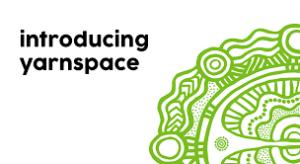
Yarnspace by Headspace [online chat forum]
This fortnightly chat forum is for Aboriginal and Torres Strait Islander people to come together in the online space on topical wellbeing issues. These chats are overseen by First Nations moderators and explore life issues that are common across our young people.
13YARN [crisis support line]
This 24/7 crisis support phone line is for mob who are feeling overwhelmed or having difficulty coping. It offers a confidential one-on-one yarning opportunity with a Lifeline-trained Aboriginal & Torres Strait Islander Crisis Supporter to get you through a tough time, at any time of the day or night.
The WellMob website newsletter
If you haven’t already, check out the WellMob newsletter or subscribe here.

Podcast: Digital Mental Health Musings
Episode 2 – Spotlight on MoodMission with David Bakker
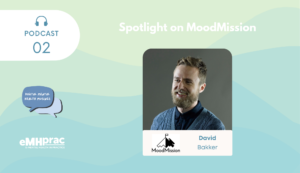
In episode 2 of the new season of Digital Mental Health Musings Dr Ruth Crowther speak to Dr David Bakker about the MoodMission app, its role in mental health treatment and integrating mental health apps into practice.
Dr David Bakker is the Founding Director of MoodMission. He is a clinical psychologist in private practice and postgraduate psychology teacher at the Institute for Social Neuroscience. He is passionate about technology and the evolution of its use in mental health support.
Ruth and David discuss the influences and development of the MoodMission app, its features, and how it can be used by clinicians in treatment and as a self-help resource. They talk about who is currently using apps, their role in mental health treatment, and future development of digital mental health tools.
Access Digital Mental Health Musings on Soundcloud, Apple Podcasts, Spotify, Google Podcasts, Amazon Music, and Deezer.

On Demand Webinar
Webinar 54 | School Refusal
Hosted by Black Dog Institute, this on demand webinar will define school refusal and summarise the range of factors underlying school refusal including child, parent/family and school factors. A collaborative approach to responding to school refusal will be described including child, parents and school strategies and skills.
Learning objectives:
- Define school refusal and compare it with other attendance problems
- Explain the range of factors that underlie school refusal
- Identify tools that can support assessment of school refusal
- Describe a collaborative approach to managing school refusal involving child, parent and school
- Identify the key elements of an attendance plan
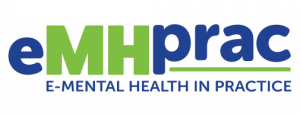
Catch us at these upcoming conferences

Workplace Wellness Festival
22 to 23 June 2022, Sydney and Online
The Workplace Wellness Festival is an annual event about all things workplace health and wellness, bringing together over 100 expert speakers, industry vendors, and thousands of business professionals on the expo floor. Over two days attendees can learn about the big picture of workplace wellbeing, or deep-dive into key topics of interest.
Speak to the eMHPrac team at our trade booth, online and in person to find out more about digital mental health tools for the workplace.
To register for the conference or view the program, click the link below:
On our reading radar
Acceptability of Web-Based Mental Health Interventions in the Workplace: Systematic Review
Scheutzow J, Attoe C, Harwood J Acceptability of Web-Based Mental Health Interventions in the Workplace: Systematic Review JMIR Ment Health 2022;9(5):e34655 URL: https://mental.jmir.org/2022/5/e34655 DOI: 10.2196/34655
“The objective of this systematic review was to conduct the first comprehensive study on employees’ level of acceptability of web-based mental health interventions…
…The results of employees’ acceptability levels were mixed, and the studies were very heterogeneous in design, intervention characteristics, and population. Approximately 79% (22/28) of the studies outlined acceptability measures from high to very high, and 54% (15/28) of the studies reported acceptability levels from low to moderate (overlap when studies reported both quantitative and qualitative results). Qualitative studies also provided insights into barriers and preferences, including simple and tailored application tools as well as the preference for nonstigmatized language. However, there were multiple flaws in the methodology of the studies, such as the blinding of participants and personnel.”
Bell I, Thompson A, Valentine L, Adams S, Alvarez-Jimenez M, Nicholas J Ownership, Use of, and Interest in Digital Mental Health Technologies Among Clinicians and Young People Across a Spectrum of Clinical Care Needs: Cross-sectional Survey JMIR Ment Health 2022;9(5):e30716 URL:https://mental.jmir.org/2022/5/e30716 DOI: 10.2196/30716
“There is currently an increased interest in and acceptance of technology-enabled mental health care. To adequately harness this opportunity, it is critical that the design and development of digital mental health technologies be informed by the needs and preferences of end users.
…This study aims to understand the technologies that young people have access to and use in their everyday lives and what applications of these technologies they are interested in to support their mental health. The study also explores the technologies that youth mental health clinicians currently use within their practice and what applications of these technologies they are interested in to support their clients’ mental health.
…Smartphone ownership or private access among young people within mental health services and the general population was universal (611/617, 99%), with high levels of access to computers and social media. Youth technology use was frequent, with 63.3% (387/611) using smartphones several times an hour. Clinicians reported using smartphones (61/76, 80%) and video chat (69/76, 91%) commonly in clinical practice and found them to be helpful. Approximately 50% (296/609) of the young people used mental health apps, which was significantly less than the clinicians (χ23=28.8, n=670; P<.001). Similarly, clinicians were significantly more interested in using technology for mental health support than young people (H3=55.90; P<.001), with 100% (73/73) of clinicians being at least slightly interested in technology to support mental health compared with 88% (520/591) of young people. Young people were most interested in web-based self-help, mobile self-help, and blended therapy.”
This edition’s featured service…

Burndawan
About Burndawan
Burndawan is a resource created with the Aboriginal and Torres Strait Islander people living on Wadawurrung Country. It is designed for Aboriginal people who would like information or support about harmful behaviours from a partner or family member in a culturally safe space. Burndawan helps users determine their needs, plan for their safety, seek healing and wellbeing.
Who is Burndawan for?
Burndawan is for Aboriginal and Torres Strait Islander people concerned about harmful behaviours from a partner or family member.
Is there a cost to access Burndawan?
There is no cost to use Burndawan.
How to access Burndawan
Burndawan can be accessed online at https://burndawan.com.au/.

